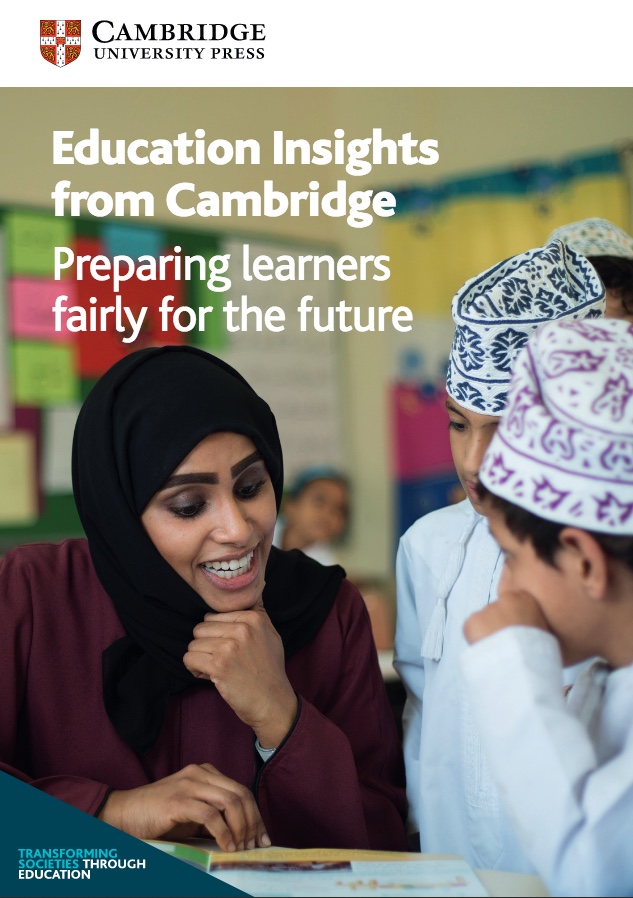In an article for the Cambridge University Press report, Education Insights From Cambridge MiSP CEO, Chivonne Preston, talks about the ways mindfulness can equip learners from a wide range of contexts and backgrounds to thrive happily within a challenging and ever-evolving work landscape.

“We do not know what specific knowledge our children are going to need ten or twenty or even five years from now because the world and their work, when they come to it, will be so different from ours. What we do know is that they will need to know how to pay attention, how to focus and concentrate, how to listen, how to learn, and how to be in a wise relationship with themselves – including their thoughts and emotions – and with others.” – Jon Kabat-Zinn, Mindfulness in Education, 2013.
At its most simple, mindfulness is the ability to be aware of experiences as they are happening, with an attitude of curiosity and kindness. Training the mind, and recognising its helpful and unhelpful habits, is a skill that can equip learners to thrive within an ever-evolving world and labour market.
Research suggests that mindfulness can improve our ability to focus, maintain, and shift attention when we choose to. These capacities represent critical components of our ‘executive function’, which underlies capacities such as reasoning, problem solving, and planning. Mindfulness therefore provides young people with fundamental skills that will be valuable throughout their lifetimes, and applicable in any setting.
Cost-effective and equitable
Furthermore, our charity has seen mindfulness successfully taught to children regardless of their academic ability, gender, prior knowledge, or socio-economic background. Implementation begins with an individual teacher who learns mindfulness, embeds mindfulness in their own teaching practice and then trains to teach mindfulness to children. Teachers can be from any educational context: we have trained teachers from pupil referral units, special schools, areas of high deprivation, as well as academically high-performing grammar and independent schools.
Almost anyone can train their mind if they want to. It is low cost, but takes time. As such, mindfulness provides an affordable, equitable, and accessible toolkit that can be introduced to a wide variety of settings, giving all learners the opportunity to flourish. It is no wonder mindfulness is a growing global trend in education, transferable across an extremely broad range of situations.
A foundation for effective learning and high performance
As well as learning how to ‘pay attention’, evidence suggests that mindfulness can also support individuals to increase focus, improve working memory, develop more cognitive flexibility, reduce stress, and self-regulate better. This facilitates more creativity, healthier relationships, improved concentration, and allows the individual more choice in how to respond in given situations.
Mindfulness therefore has value whether a learner’s tasks are relationship focused, task focused, process driven, technology related, or require blue-sky thinking and new ideas.
Educating our young people in mindfulness will prepare them to be agile, resilient, and flexible in this new work environment. But more than that, it will prepare them as citizens of the future: as workers but also as neighbours, parents, and community members contributing positively towards our developing society.
In the context of mental and physical health, applications of mindfulness demonstrate its value in moderating conditions that inhibit learning and personal development: in stress and pain reduction, in immune function and the body’s ability to fight infection, and in the treatment of recurrent depression and anxiety.
Mindfulness training, when done well, enables learners to observe and work with the mind’s habits, and identify the impact of mindfulness on the mind and body. Using physical sensations within the body as an anchor point, it is possible to train the ‘muscle’ of attention, recognising how the mind wanders and learning to gently guide it back to the anchor point. Each time this is done, the neural pathways that enable the learner to sustain and maintain an attentional focus are strengthened.
Mindfulness therefore has a significant role to play in educational contexts – and it should be no surprise that it is a growing phenomenon among elite performers in business, sports disciplines, and the arts.
In 2015, the Mindfulness All Party Parliamentary Group published its Mindful Nation UK report, which recommended that mindfulness teaching in schools should be pioneered and funded, and best practice disseminated. A detailed recent review of research evidence on classroom-based mindfulness programmes concluded:
“Mindfulness is […] likely to have beneficial effects on the emotional well-being, mental health, ability to learn, and the physical health of school students […] Such interventions are relatively cheap to introduce, have an impact fairly quickly, can fit into a wide range of contexts, and are enjoyable and civilising, for pupils and staff.”
This is why our charity is campaigning to bring mindfulness to more schools. Over the next five years, we aim to reach one million children.